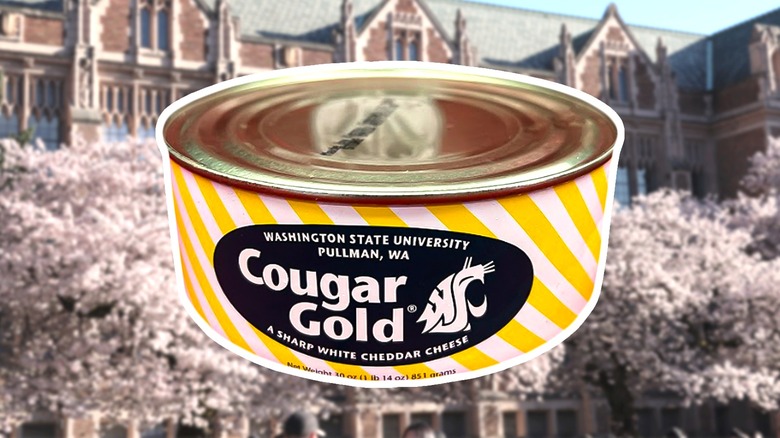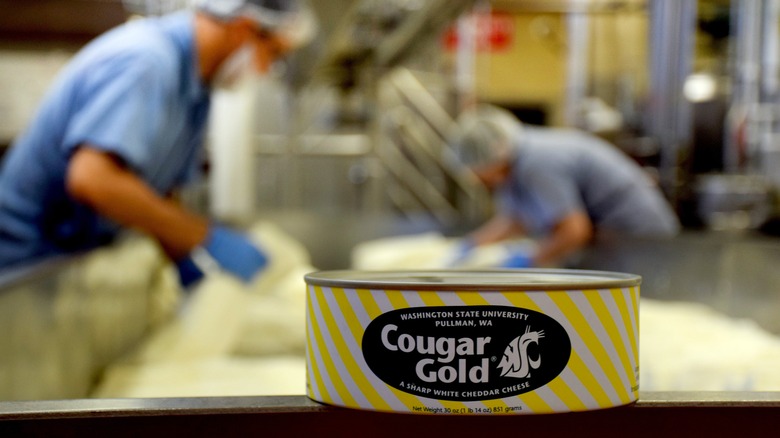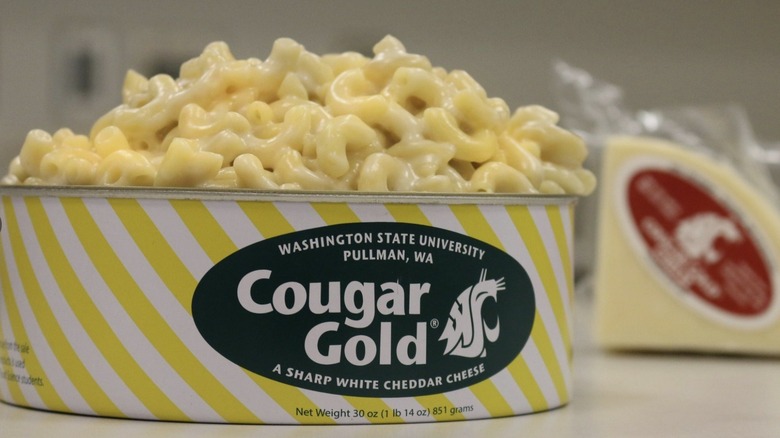Cougar Gold Is The Award-Winning Canned Cheese Made On A College Campus
When you think of canned cheese, the first thing that comes to mind is probably the highly processed stuff that can be sprayed straight from can to cracker. Although it has since been elevated at a competitive eating level — one of the 2024 competitors at Nathan's Hot Dog Eating Contest (not former champion Joey Chestnut) holds the record for consuming two cans worth in under a minute — sprayable cheese was created for the sake of casual convenience in the 1960s. But while it might be the cheapest cheese-in-a-can you can buy, it's certainly not the best. That honor belongs to a very special one called Cougar Gold. Sure, it has to be sliced out of a tin to snack on or cook with, but it's well worth the extra effort.
There are lots of canned foods that were popular 50 years ago that haven't withstood the test of time, but Cougar Gold isn't one of them. Surrounded by rolling hills and grassy farmlands in the southeastern corner of The Evergreen State, Washington State University's creamery in Pullman has been producing the rich, sharp white cheddar since the 1940s. Instead of selling it by the block, they discovered how to safely store and age it in a 30-ounce can — a feat in food science at the time. While it might be hard to believe that canned cheese could be good enough to earn a cult following, Cougar Gold has garnered its fair share of awards from prestigious national and international cheese-tasting competitions.
How Cougar Gold gets made
When it comes to cheese-making, WSU Creamery has a long, storied history. After the dairy plant was destroyed by a fire in 1902, the college underwent a decades-long rebuilding process. By the 1930s, WSU's cheesemakers were back to work and became interested in figuring out new ways to store the dairy product (via WSU Creamery). At the time, plastic manufacturing was still in its infancy and wouldn't become a mainstream material for food packaging until well after World War II, according to Ohio State University. Wax, another storage option, was vulnerable to damage, so the creamery moved on to metal cans. However, pressing cheese into tins for long-term storage wasn't so straightforward.
In the 1940s, WSU researchers received funding from the federal government and the American Can Company to figure out how to successfully can cheese. Problematically, when the creamery's natural cheese ages, a process crucial to developing its taste, it produces carbon dioxide. This can cause sealed containers to expand and even explode. However, Dr. N.S. Golding and his fellow researchers eventually found a type of lactic acid that prevented can-shattering emissions and became the foundation for the award-winning Cougar Gold cheese (via Moscow-Pullman Daily News).
Since then, the creamery has scaled up operations to make Cougar Gold (and several other flavors of cheese) year-round and for customers around the world. According to the creamery's website, WSU's dairy facilities now produce 250,000 cans of cheese annually — 200,000 of which contain year-aged Cougar Gold cheddar.
Canned Cougar Gold is a world-class cheese
Sadly, Dr. N.S. Golding, who served as half of the inspiration for Cougar Gold's name, didn't live to see the cheese win its first national and international awards. The lead researcher behind the canned cheese and several other dairy-based discoveries passed away in 1984, four years before Cougar Gold earned its first blue ribbon from the American Cheese Society. It eventually won three other awards in stateside competitions in the 1990s, but made its mark globally at the turn of the century. In 2000, Cougar Gold received a silver medal at the World Cheese Awards (basically the Olympics for cheesemakers) and finally struck gold in 2006 — giving the cheese's name another special meaning.
This crumbly, award-winning aged cheddar isn't the only type of uniquely packaged dairy product that WSU Creamery produces and sells, though. It also makes an array of other cheeses, including an American-style orange cheddar and Viking — a semi-soft variety comparable to Monterey Jack (via WSU Creamery). From dill and garlic to spicy jalapeño and cayenne peppers, there are plenty of fridge-worthy flavors worth serving with crackers or cooking into creamy soups or mac and cheese. Unfortunately for anyone fond of blue and Swiss cheeses, WSU Creamery is unlikely to ever sell these types. The brand's website notes that the former's mold could contaminate the cheddar (a common problem), while Swiss cheese's holes are partly created by carbon dioxide, making it unavoidably un-cannable. Ah, well, the more Cougar Gold, the merrier.


